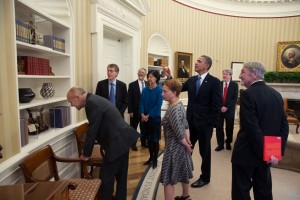I wonder if the patent models that currently adorn the Oval Office will remain after the transition.
Archive for January, 2017
Patent Models
Wednesday, January 11th, 2017Oral argument of the week: Voxathon v. FCA
Saturday, January 7th, 2017The oral argument of the week is Voxathon v. FCA, argued on December 5, 2016. The oral argument focuses on §101 issues. There was a brief portion of the oral argument where Judge Clevenger took the discussion in the direction of analogizing the abstract idea assessment to an infringement assessment. That is something that seems to have gotten lost in the §101 mess — claim scope is treated entirely differently for purposes of §101 than it is for §§271 (infringement), 102, or 103. To the extent possible, it would be beneficial if the judges of the Federal Circuit would invoke §271 principles as part of their analyses when evaluating §101.
You can listen to the oral argument [here].
You can review the court’s Rule 36 Judgment [here].
Chief Justice Roberts has recused himself from the LIFE TECHNOLOGIES case
Friday, January 6th, 2017Chief Justice Roberts has recused himself from the Life Technologies Corp. v. Promega Corp. case that was argued December 6th, due to his stock ownership in Thermo Fisher Scientific. [Source].
Judge Wallach’s book “Jake and Me”
Thursday, January 5th, 2017I was not aware that Judge Wallach published a book in 2015. It is entitled “Jake and Me” and set in Arizona in the 1920’s. You can read more about it on Amazon at this [Link].
The book has quite an attention-grabbing opening line.
TC Heartland
Wednesday, January 4th, 2017With certiorari having been granted in the TC Heartland case, I was interested to learn that spreading the Eastern District of Texas’ workload across more inexperienced judges in other districts might actually result in more infringement verdicts for patent owners: [Link]
Oral argument of the week: MACROPOINT v. FOURKITES
Tuesday, January 3rd, 2017The oral argument of the week is MACROPOINT, LLC v. FOURKITES, INC., No. 2016-1286 (Fed. Cir. Dec. 8, 2016) decided by a Rule 36 judgment. The case focuses primarily on §101 issues.
You can listen to the oral argument here [Listen].
You can review the Rule 36 judgment [here].
Thought for the day:
[T]his Court has emphasized that “in a system of laws discretion is rarely without limits.” Flight Attendants v. Zipes, 491 U.S. 754, 758, 109 S.Ct. 2732, 105 L.Ed.2d 639 (1989); see Halo Electronics, Inc. v. Pulse Electronics, Inc., ___ U.S. ___, ___, 136 S.Ct. 1923, 1931, ___ L.Ed.2d 1986*1986 ___, 2016 WL 3221515 (2016) ante, at 8. Without governing standards or principles, such provisions threaten to condone judicial “whim” or predilection. Martin, 546 U.S., at 139, 126 S.Ct. 704; see also ibid. (“[A] motion to [a court’s] discretion is a motion, not to its inclination, but to its judgment; and its judgment is to be guided by sound legal principles” (quoting United States v. Burr, 25 F.Cas. 30, 35 (No. 14,692d) (C.C.Va.1807) (Marshall, C. J.))). At the least, utterly freewheeling inquiries often deprive litigants of “the basic principle of justice that like cases should be decided alike,” Martin, 546 U.S., at 139, 126 S.Ct. 704 . . . .
Kirtsaeng v. John Wiley & Sons, Inc., 136 S. Ct. 1979, 1985-86 (2016).
Beware the lynx
Monday, January 2nd, 2017For those of you headed out here to Colorado for the Ski-CLE, watch out for the lynx!
Here’s the snow report [Link].
